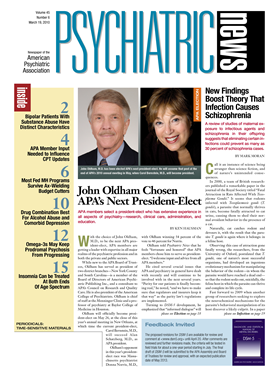In February I attended our Advocacy Day between two snowstorms. In fact, because the federal government was closed for four days, some of our visits to members of Congress on Capitol Hill were canceled or postponed. Nonetheless, I was really impressed by our Advocacy and Government Relations' staff, as well as our folks from the political action committee, known as APAPAC. They organized a terrific planning session as well as a host of Hill visits.
APA's Advocacy Day is an annual event for which APA members travel to Washington, D.C., to learn about federal health policy challenges facing psychiatry and to urge their members of Congress to support APA-backed solutions. Attendees participated in several days of training and heard updates on a number of issues before visiting the offices of members of Congress.
This past year has been an incredible year of political change. A new administration in Washington, D.C., is trying to push through meaningful health reforms, so many of which are contentious and are being hotly debated in Congress. How do we make sure as psychiatrists and physicians that our positions and interests are represented? A strong, well-funded political action committee, or PAC, working in tandem with APA's advocacy efforts, is the best way to make sure your lawmakers are listening.
Thanks to the support of APA members who already contribute, APA's PAC is increasingly visible and respected within the national political arena, and particularly the health arena, where our PAC is working for a better practice environment for you and your patients. And this is accomplished with only 6 percent of the membership contributing to the effort, a disappointing percentage when you consider all that APA's advocacy efforts have helped achieve, such as passage of the federal parity law and elimination of the discriminatory Medicare copay. Just think how much more we could accomplish if more of us became involved. Our political and advocacy access, standing, and importance would be unrivaled.
Now is the time to increase your support of APA's advocacy efforts. This year brings unique opportunities, with midterm elections in November and the fix of Medicare's flawed physician-payment system still hanging in the balance. We also continue to be actively engaged in the health reform debate and ensuring that the federal parity law is properly and appropriately enforced.
At press time, it remained unclear when or whether the House and Senate will resume efforts to craft a compromise reform proposal, but President Obama has just released a new outline for compromise that may jumpstart the process (see
Democrats Try New Strategy in Health Reform Effort). We believe reforming this country's health care system is too important to allow its failure to be an option. We have been urging senators and representatives to resume discussions.
Even if the health care reform effort dies, the issues and concerns are still in play, and we will continue our work to improve the health and lives of our patients and the profession and practice of psychiatry. APA, with the help of our PAC, is working with Congress on a wide-ranging agenda. Among the issues:
•.
Enacting a permanent Medicare physician payment fix and removing the accumulated “debts” caused by the flawed sustainable growth rate formula.
•.
Preserving and enhancing advances in parity for mental health and substance use disorder treatment.
•.
Requiring any potential basic benefit package/public option to include treatment for mental illness, including substance abuse, for all plans offered in the insurance exchange.
•.
Expanding Medicaid eligibility.
•.
Prohibiting discrimination due to health status or preexisting conditions.
•.
Raising the cutoff age for eligibility of dependents to be covered by their parents' insurance.
•.
Stopping the formation of the Independent Payment Advisory Board (IPAB). This board would independently make Medicare reimbursement and payment decisions without physician and/or Congressional review or input.
•.
Securing federal support for residency training and loan-repayment programs for psychiatry and not just primary care physicians.
•.
Facilitating co-location of psychiatric and primary care services as part of a “medical home.”
The message from the recent Massachusetts special election is that we must be prepared for some major changes in Congress come November. A well-funded APAPAC is a vital part of our efforts to find friends in Congress who support our health agenda. Right now, as I noted above, fewer than 6 in 100 APA members are active PAC contributors. We need to stop leaving it to other APA members to take care of all of our shared political interests. We're stronger when we work together. Your contribution helps APAPAC gain more of a national presence and grow our political clout.
Please contribute to APA
PAC today. To do so, go to <
www.psych.org/pac>. This is an annual investment that each of us should make for our patients as well as our profession.


